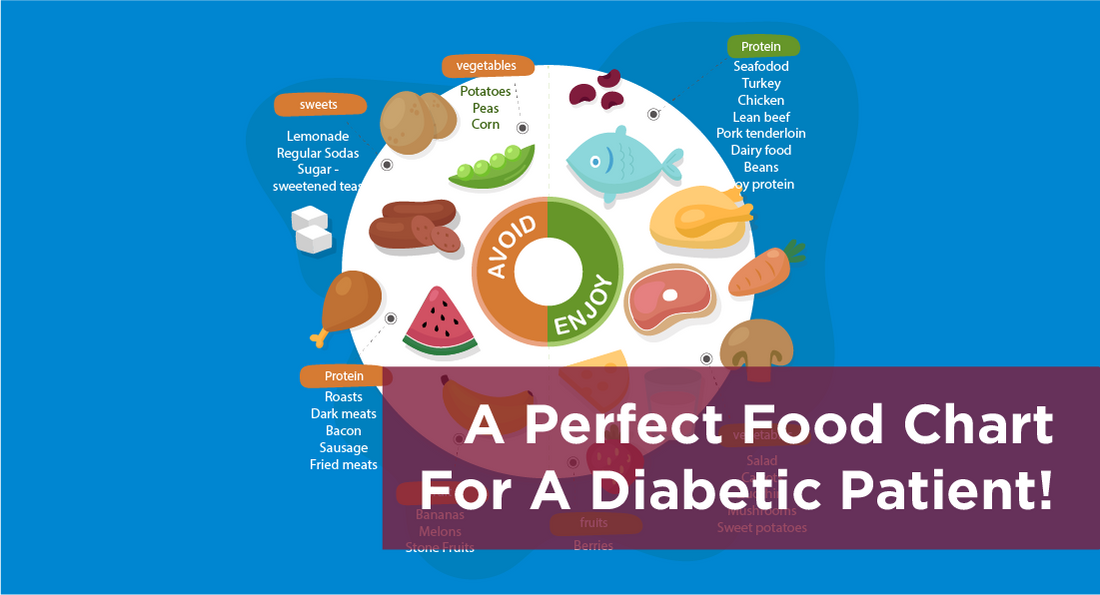Diabetes is a chronic disease that affects millions of people worldwide. It is a condition where the body cannot produce or use insulin effectively, resulting in high levels of glucose in the blood. Managing diabetes requires a combination of medication, exercise, and, most importantly, a healthy diet. In this article, we will discuss the perfect food chart for a diabetic patient, including dietary restrictions and healthy snack options.
Understanding a Diabetic Diet Plan
A diabetic diet plan is a balanced and healthy eating plan designed to help manage blood sugar levels. It focuses on controlling the intake of carbohydrates, as they have the most significant impact on blood sugar levels. A diabetic diet plan also includes a variety of nutrient-rich foods, such as fruits, vegetables, whole grains, lean proteins, and healthy fats.
Monitoring and Adjusting Your Diet:
1. Eat various foods from all food groups: Include a combination of grains, fruits, vegetables, dairy, and protein in your daily meals.
2. Control portion sizes: Be mindful of portion sizes to avoid overeating and maintain a healthy weight.
3. Choose whole grains: Opt for brown rice, whole wheat bread, and oats instead of refined grains.
4. Limit processed foods: Minimize the consumption of processed foods as they often contain added sugars and unhealthy fats.
5. Include high-fiber foods: Fiber-rich foods like lentils, beans, and vegetables help regulate blood sugar levels.
6. Eat regular meals: Stick to a consistent eating schedule to keep blood sugar levels stable throughout the day.
7. Monitor carbohydrate intake: Keep track of the number of carbohydrates consumed per meal to manage blood sugar levels effectively.
8. Control sugar intake: Limit the consumption of sugary foods and beverages, including desserts, sodas, and sweetened juices.
9. Choose lean protein sources: Opt for lean protein sources like chicken, fish, tofu, and legumes to reduce saturated fat intake.
10. Use healthy cooking methods: Grill, bake, steam, or sauté foods instead of frying to reduce the amount of added fats.
11. Limit salt intake: Reduce the amount of salt in your diet to maintain healthy blood pressure levels.
12. Drink water: Stay hydrated by drinking plenty of water throughout the day.
13. Avoid sugary drinks: Opt for water, unsweetened tea, or low-sugar beverages instead of sugary drinks.
14. Include healthy fats: Incorporate sources of healthy fats like avocados, nuts, and olive oil in your diet.
15. Choose low-fat dairy: Opt for low-fat or skim milk, yogurt, and cheese to reduce saturated fat intake.
16. Read food labels: Pay attention to food labels to identify hidden sugars, unhealthy fats, and high sodium content.
17. Plan meals: Plan your meals ahead of time to ensure a balanced and nutritious diet.
18. Limit alcohol consumption: If you choose to drink alcohol, do so in moderation and avoid sugary cocktails.
19. Snack smartly: Choose healthy snacks like nuts, seeds, and vegetables to satisfy cravings without sugar spikes.
Best Snacks For Diabetes In India:
Snacking is an essential part of a diabetic diet plan, as it helps prevent blood sugar levels from dropping too low. However, it is crucial to choose healthy snack options that are low in carbohydrates and high in nutrients. Here are some healthy snack options for diabetic patients:
- Fresh fruits: Fruits are a great source of vitamins, minerals, and fibre. They are also low in calories and carbohydrates, making them an ideal snack for diabetic patients. Some fruits suitable for diabetic patients include apples, berries, and citrus.
- Nuts and seeds: Nuts and seeds are a great source of healthy fats, protein, and fibre. They are also low in carbohydrates, making them an excellent snack option for diabetic patients. Some nuts and seeds suitable for diabetic patients include almonds, walnuts, and chia seeds.
- Vegetables with hummus: Vegetables are low in calories and carbohydrates and are packed with essential nutrients. Pairing them with hummus, which is made from chickpeas, adds protein and healthy fats to the snack, making it a well-rounded option for diabetic patients.
- Greek yoghurt: Greek yoghurt is an excellent source of protein and calcium and is low in carbohydrates. It also contains probiotics, which can help improve gut health. Diabetic patients can add fresh berries or nuts to their Greek yogurt for a delicious and healthy snack.
A Balanced Food Chart for Diabetic Patients
A perfect food chart for Indian diabetic patients should include a variety of nutritious foods that help maintain stable blood sugar levels. Here is a list of Indian foods that can be incorporated into a diabetic patient's meal plan, along with their respective nutrients:
1. Whole grains:
- Brown rice: Rich in fibre, vitamins, and minerals.
- Millets (such as jowar, bajra, and ragi): High in fibre, protein, and antioxidants.
- Whole wheat roti: Provides complex carbohydrates for sustained energy.
2. Pulses and legumes:
- Moong dal: High in protein, low in fat, and rich in fibre.
- Chana dal: Good source of protein, fibre, and essential minerals.
- Rajma: Contains fibre, protein, and iron.
3. Vegetables:
- Bitter gourd: Low in calories and carbohydrates, helps regulate blood sugar levels.
- Spinach: Rich in vitamins, minerals, and antioxidants.
- Bottle gourd: Low in calories and carbohydrates, aids digestion.
4. Fruits:
- Guava: Rich in dietary fibre, vitamin C, and antioxidants.
- Papaya: Contains vitamins, minerals, and digestive enzymes.
- Oranges: High in vitamin C and fibre.
5. Dairy products:
- Low-fat milk: Provides calcium and protein.
- Yogurt: Contains probiotics, calcium, and protein.
- Paneer (Indian cottage cheese): Good source of protein and calcium.
6. Nuts and seeds:
- Almonds: High in healthy fats, protein, and fibre.
- Flaxseeds: Rich in omega-3 fatty acids and fibre.
- Walnuts: Contains antioxidants and omega-3 fatty acids.
7. Herbs and spices:
- Turmeric: Has anti-inflammatory properties.
- Cinnamon: Helps regulate blood sugar levels.
- Fenugreek seeds: Can help lower blood sugar levels.
Creating a proper food chart involves balancing the intake of these foods throughout the day, considering portion sizes and individual dietary needs. It is essential to consult a healthcare professional or a registered dietitian to create a personalized food chart based on specific health requirements and preferences.

Tips for Managing Diabetes with a Healthy Diet
In addition to following a diabetic diet plan, here are some tips that can help manage diabetes and improve overall health:
- Stay hydrated: Drinking enough water is essential for managing diabetes. It helps flush out excess sugar from the blood and prevents dehydration.
- Exercise regularly: Regular physical activity can help control blood sugar levels and improve insulin sensitivity. It also helps with weight management and reduces the risk of heart disease.
- Monitor blood sugar levels: It is crucial to monitor blood sugar levels regularly to ensure they are within the target range. This can help identify potential issues and allow for timely adjustments to the diet and medication.
- Consult a registered dietitian: A registered dietitian can help create a personalized diabetic diet plan and provide guidance on managing diabetes through diet and lifestyle changes.
Components Of A Balanced Diabetic Meal Plan:
Kindly note that your request may be unrelated to the article's content. However, I can provide some information on the components of a balanced diabetic meal plan for Indians.
Here are some key components to include in a balanced diabetic meal plan for Indians:
1. Complex Carbohydrates:
Include whole grains such as brown rice, wheat bread, and oats. These carbohydrates are rich in fibre and take longer to digest, helping to control blood sugar levels.
2. Protein:
Include lean protein sources such as chicken, fish, tofu, and legumes. Protein helps to slow down the absorption of sugar into the bloodstream and keeps you feeling full for longer.
3. Healthy Fats:
Include sources of healthy fats such as avocados, nuts, seeds, and olive oil in your meals. These fats help to improve insulin sensitivity and reduce the risk of heart disease.
4. Fruits and Vegetables:
Include a variety of colourful fruits and vegetables in your meals. These are low in calories and high in fibre, vitamins, and minerals. Aim to include at least two servings of fruits and 3-4 servings of vegetables daily.
5. Limited Sugar and Refined Carbohydrates:
Limit the consumption of sugary foods, sweets, and beverages, as well as refined carbohydrates such as white bread, pasta, and pastries. These foods can cause a rapid increase in blood sugar levels.
6. Portion Control:
Practice portion control by measuring your food and eating regular meals at consistent times. This helps to keep your blood sugar levels stable throughout the day.
7. Hydration:
Drink plenty of water throughout the day to stay hydrated. Avoid sugary drinks and drink water, herbal tea, or unsweetened beverages.
8. Regular Meal Timing:
Stick to a regular meal schedule and avoid skipping meals. This helps to maintain stable blood sugar levels and prevents overeating.
Remember, it is essential to consult a registered dietitian or healthcare professional for personalized advice and guidance on managing diabetes and creating a balanced meal plan that suits your specific needs.
Conclusion
A healthy and balanced diet is crucial for managing diabetes and preventing complications. By following a diabetic diet plan and making healthy food choices, diabetic patients can control their blood sugar levels and improve their overall health. It is also essential to consult a healthcare professional for personalized advice and guidance on managing diabetes. With the proper diet and lifestyle changes, diabetic patients can lead a healthy and fulfilling life.
This Blog post is an initiative by DiabeSmart, to provide accurate and Nutritionist / Doctor approved information related to Diabetes. DiabeSmart is India's first Food brand designed specifically for Diabetics, that has been clinically tested on Diabetics and Pre-Diabetics to deliver 55% - 70% lower Sugar spikes. DiabeSmart is part of Lo! Foods - India's leading brand for Everyday Functional Health foods.










1 comment
Very useful information